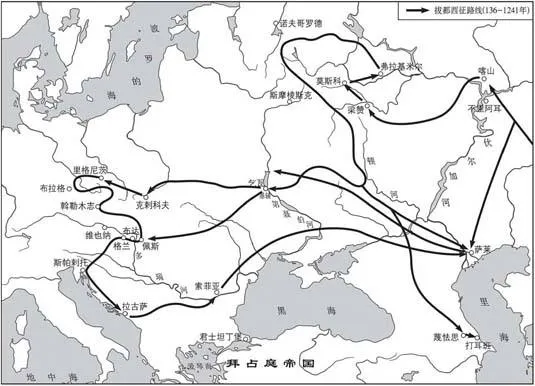At the beginning of 1242, the Mongols had been marching west for 7 years, after the Mongols had conquered all the principalities of Trös, captured several principalities of Poland and Lithuania, and completely annihilated the 70,000 troops of the Hungarian king Béla IV at the Battle of the Tisza River, and Bella IV fled to a small town on the Adriatic Sea in Croatia.
After the Mongols captured Budapest, the capital of the Kingdom of Hungary, it took about half a year to wipe out the resistance in Hungary, and then prepared to continue to attack the heart of Europe to the west, all the way to the remnants of Beira IV's army, and the army pointed directly at Zagreb, Croatia.
The strategic policy formulated by the Mongol commander Batu and the deputy commander Subutai was to prepare to divide the troops into two routes, from Croatia, and the first army to the west to attack Venice and take the whole Kingdom of Italy. Another army attacked Vienna to the north, then along the Oder River to capture all of Germany, and then divided a part of its forces to attack the Baltic states. After the completion of the mission of the two armies, they will attack separately and conquer the Franks, the Netherlands and other countries, thus completing the strategic goal of conquering every country encountered from the west of the Irtysh River to the final sea.
Just when the Mongols were at their peak, something big happened in the Mongol Empire, history seemed to be a joke, in November 1241, the second Great Khan of the Mongol Empire, Kuotai, died, this drunkard feasted and drank every day, and Yelü Chucai bitterly advised him to drink less, and finally died of drinking.
After wokoutai's death, Empress Thregona sent a decree to inform the kings of the clans and the Mongol noble generals who were fighting through the Mongols' newly built 10,000-mile post station system in Europe, and to ask the noble generals of the clans to return to the Mongolian steppe to hold the Kuritai Assembly to elect the new Great Khan of the Mongol Empire.
When the messengers of the Mongol Empire sent the news of wokoutai's death to the commander of the Western Expedition, Battus, and the deputy commander Subutai, the Mongols' northern army was only 15 kilometers away from the Austrian city of Vienna, and the Mongol generals could already see the spire of the church in the city in the distance, and the Mongol army on the western road was still 50 kilometers away from Venice.
Batu ordered the Mongol army to halt its attack, and the whole army held a nine-day mourning service for the Great Khan of Wokoutai. At this time, the generals of the Mongol Western Expeditionary Army had a disagreement about the next action, and several brothers and veteran generals of Battus thought that they did not have to pay attention to the will of Deregona, taking advantage of the morale of the Mongol army to capture the remaining countries in Europe in one go, and now the situation was very favorable to the Mongols, and once they were angry, they declined, and then they exhausted, missed this fighter, and it was difficult to make up for it. The generals of the Chagatai, Wokoutai, and Tuolei families believed that they should obey the will of Theregona, because the Mongols had always had iron discipline and unconditional obedience to the orders of their superiors.
At this time, Batu, as the commander of the Western Expedition, also judged the situation and ended the Second Western Expedition of the Mongols. In fact, when the battle came to this part, the biggest beneficiary was only the Shuchi family, because the will of Wokoutai was to divide all the land from the west of the Irtysh River to the final ocean to be divided among the descendants of the Shuchi family, and the benefits of an inch of land of the Chagatai, Wokoutai, and Tuolei families were not obtained, and they could only be distributed to the gold, silver, jewelry, slaves, and livestock obtained from the war, so after receiving the order to return to the steppe, the other families except the Shuchi family did not hesitate to go back, because in their view, Europe at that time was too poor, and there was really nothing to grab. They couldn't get land, so they wanted to return to the Mongolian steppe as soon as possible.
Because the Mongol Western Expeditionary Army stopped attacking and prepared to return to the east, a fierce quarrel occurred between Battu and Subutai, which made the Mongol veteran general who had experienced hundreds of battles have killed the red eye at this moment and insisted on continuing to advance westward, and Batu had no choice but to order people to tie Subutai with a rope and forcibly take him away from the battlefield.
Battu rode to the cliffs on the Adriatic coast of Croatia, looked at the blue ocean in the distance, issued an endless sigh, and in his heart he estimated that his drunkard third uncle had cursed a seven meat and eight vegetarians, thinking that if the third uncle had not drunk to death, and then give me some time, I would be able to step on the whole of Europe under the iron hooves of the Mongols.
